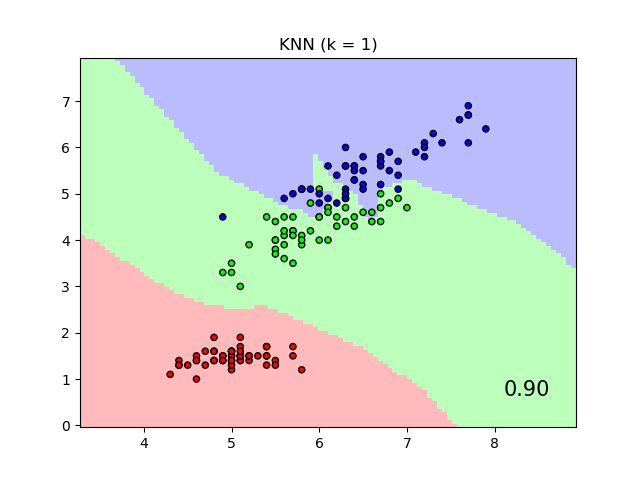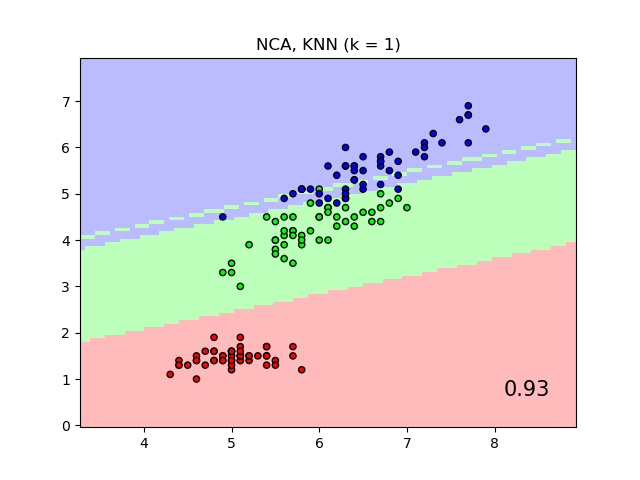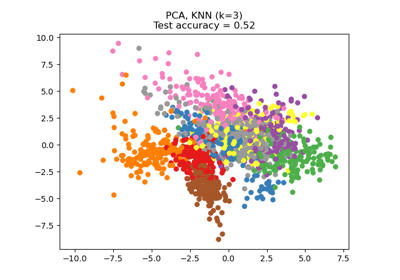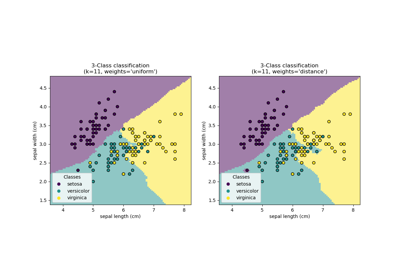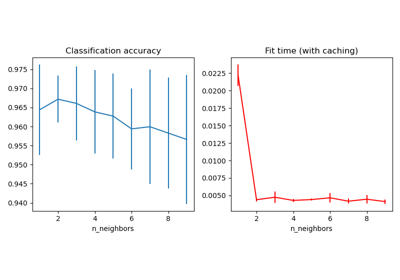注意
跳转至末尾 下载完整示例代码,或通过JupyterLite或Binder在浏览器中运行此示例
比较有无邻域成分分析的近邻算法#
一个比较有无邻域成分分析的近邻分类算法的示例。
它将绘制使用原始特征欧氏距离的近邻分类器给出的类别决策边界,以及使用邻域成分分析学习的变换后欧氏距离的类别决策边界。后者旨在找到一个线性变换,以最大化训练集上的(随机)近邻分类准确度。
# Authors: The scikit-learn developers
# SPDX-License-Identifier: BSD-3-Clause
import matplotlib.pyplot as plt
from matplotlib.colors import ListedColormap
from sklearn import datasets
from sklearn.inspection import DecisionBoundaryDisplay
from sklearn.model_selection import train_test_split
from sklearn.neighbors import KNeighborsClassifier, NeighborhoodComponentsAnalysis
from sklearn.pipeline import Pipeline
from sklearn.preprocessing import StandardScaler
n_neighbors = 1
dataset = datasets.load_iris()
X, y = dataset.data, dataset.target
# we only take two features. We could avoid this ugly
# slicing by using a two-dim dataset
X = X[:, [0, 2]]
X_train, X_test, y_train, y_test = train_test_split(
X, y, stratify=y, test_size=0.7, random_state=42
)
h = 0.05 # step size in the mesh
# Create color maps
cmap_light = ListedColormap(["#FFAAAA", "#AAFFAA", "#AAAAFF"])
cmap_bold = ListedColormap(["#FF0000", "#00FF00", "#0000FF"])
names = ["KNN", "NCA, KNN"]
classifiers = [
Pipeline(
[
("scaler", StandardScaler()),
("knn", KNeighborsClassifier(n_neighbors=n_neighbors)),
]
),
Pipeline(
[
("scaler", StandardScaler()),
("nca", NeighborhoodComponentsAnalysis()),
("knn", KNeighborsClassifier(n_neighbors=n_neighbors)),
]
),
]
for name, clf in zip(names, classifiers):
clf.fit(X_train, y_train)
score = clf.score(X_test, y_test)
_, ax = plt.subplots()
DecisionBoundaryDisplay.from_estimator(
clf,
X,
cmap=cmap_light,
alpha=0.8,
ax=ax,
response_method="predict",
plot_method="pcolormesh",
shading="auto",
)
# Plot also the training and testing points
plt.scatter(X[:, 0], X[:, 1], c=y, cmap=cmap_bold, edgecolor="k", s=20)
plt.title("{} (k = {})".format(name, n_neighbors))
plt.text(
0.9,
0.1,
"{:.2f}".format(score),
size=15,
ha="center",
va="center",
transform=plt.gca().transAxes,
)
plt.show()
脚本总运行时间: (0 分钟 0.723 秒)
相关示例

